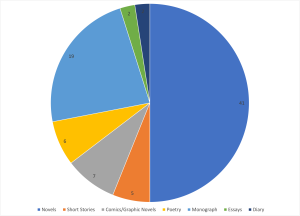I’ve given up any pretense of doing these on anything like a weekly basis. One thing that means is that several of the articles here are a little older, but in general most of them aren’t particularly prone to expiration, and I think they’re all worth going back to.
Article: “Uncharted” by Lisa M. Hamilton
You may have heard of the Svalbard Seed Vault, a kind of high-tech warehouse on a remote arctic island which will, in theory, provide a safe “bank” for various kinds of seeds, allowing us to recover key food crops and other plants in the event of some kind of environmental disaster. Part of the point of the project is also to maintain, or at least make possible, higher levels of biodiversity, since we’ve also figured out that basing our entire food supply on one variety of corn or wheat or whatever, though it has some upsides, has made us tremendously vulnerable to even small shifts in environmental conditions.
Saving the crops we know about is one side of this issue; another is the attempt to find new varieties, which might be cross-bred with, or even replace, existing strains that are threatened. Hamilton looks at one research team’s search for wild, perhaps ancestral varieties of rice in a remote region of northern Australia. Rice is the worlds biggest and most important food crop, but large areas of rice cultivation are threatened, in one way or another, by climate change. Finding wild varieties that have adapted to various kinds of climatic conditions on their own may be the key to maintaining global rice production.
Article: “Thinking Out Loud” by Michael Eric Dyson
If you live in the United States and have been paying attention, you have probably been reading and talking and thinking a lot about race in the last year or so; this cultural conversation has led to new levels of prominence for a younger generation of black thinkers and writers like Ta-Nehisi Coates. Dyson— a prominent representative of the previous generation— argues that this group constitutes a “new black digital intelligentsia,” equally at home writing blog posts or tweets as scholarly books and articles, and able to effectively use those media to introduce or grapple with big, complicated, messy ideas in a useful and intelligent way. It’s a typically thoughtful analysis on Dyson’s part; he is careful to say, for instance, that “there is danger in the belief that everything—every idea, issue, conflict, disagreement, or difference of perception—can be solved, or even usefully summed up, in 140 characters, or in a posting on Facebook,” but that there is equal danger in dismissing these ways of communicating purely because they are quick and immediate. He suggests that what distinguishes this new generation is less the technology itself than the fact that they are testing out and refining their ideas in a much more public way, using digital media as a kind of first draft before sitting down to hammer out and clarify them in their final, more sophisticated form. There’s a big list of really interesting people to pay attention to in the piece, with links to a piece or two by each; I am particularly a fan of Jamelle Bouie at Slate.
Article: “Down the Rabbit Hole” by Evan Kindley
I have theThe Annotated Alice in Wonderland sitting on my bookshelf, but I really knew very little about it except that it is full of fun facts about Carroll’s book. Kindley is interested in what he sees as an increased interest in annotation generally, marked most prominently by the transformation of Rap Genius into Genius as the site expands to include texts of all kinds. He sees the publication of the Annotated Alice as kicking off a kind of slow movement in this direction, or at least as an early example of the impulse. I didn’t know that the Annotated Alice had been around so long, or that it was considered so seminal; I also knew nothing really about the editor, Martin Gardner, who was a pretty interesting guy in his own right. (I did know that Genius is sometimes kind of a mess.) More generally, the piece is an exploration of what it is that attracts us to annotations, both making them and reading them.
Article: “‘This Goes All the Way to the Queen’: The Puzzle Book that Drove England to Madness” by Jess Zimmerman
This is a piece that, if nothing else, underlines how distinct the cultures of different countries remain, even two countries as alike as the U.S. and the U.K., and as recently as 1979. Zimmerman describes the wild popularity of Kit Williams’s book Masquerade which contained a puzzle that led to a gold rabbit hidden somewhere in the U.K. What is striking is not just that a lot of people read the book, or that they tried to solve the puzzle; what’s fascinating is that they so many people took the search to such extremes, finding incredibly complex and esoteric symbols and codes in it when in fact the actual puzzle was relatively simple and required no extra knowledge or research beyond what was actually in the book itself. Zimmerman examines the phenomenon of Masquerade as an instance of apophenia, the perception of meaning or pattern in random or unconnected bits of information. Apophenia was first described in relation to schizophrenia, but there’s a case to be made that’s a universal human tendency that schizophrenics simply take to extremes (paradoleia, which is what is happening when you see the “man in the moon,” is a type of apophenia). In any case, it’s a good story that seems to be fairly little known outside the U.K.
Article: “Havana’s Hotspots” by Jonathan M. Katz, with photos by Allison Shelley
As Cuba’s relations with the U.S. thaw, both goods and information have begun, gradually, to flow more freely. One obvious but important sign of this is access the internet, which had been essentially non-existent for most Cubans but is now available at a limited number of public hotspots. All kinds of big players—governments including the U.S. and China, as well as companies like Google and Huawei, the apparent leader— are looking to be the supplier to a large and virtually untapped market, but of course the Cuban government is wary of anything that will reduce their control, or that smacks of capitalist subversion. Katz quotes one Cuban official as saying:
“There are some that would like to give us [internet] for free, but they don’t do it with the goal of letting the Cuban people communicate, but rather to invade us and do the ideological work to succeed in a new conquest. We have to have internet, but our way.”
With that perspective in mind, it’s not at all clear what the terms of access will be for Cubans, or what the larger social effects will be. Plus, it turns out that many Cubans are already watching and listening to a lot of American media; one of the many interesting details in this piece is the paquete semanal, a “weekly packet” of (pirated) shows and movies that is downloaded by a few distributors and sold on, hard drive to hard drive, to a large Cuban audience. It’s a good example of the fact that, when it comes to a society or a political system, “open” and “closed” aren’t necessarily the only options.
Photos/Article: Souvenir d’un Futur by Laurent Kronental
As in the U.S., the period following WWII led to the growth in France of large public housing projects, in their case largely in and around Paris and meant to cope with a housing shortage as both internal and external migrants moved to the city in large numbers. Called Grands Ensembles, many of these projects reveal a much greater willingness to experiment with the architecture than the typical housing project in the U.S., and perhaps therein a very different idea about what the their function would be. As Korental’s title for his series suggests, many of the buildings look futuristic in the specific way of old science fiction. Most are now scheduled to be demolished, so Korental is trying to document them before that happens.
A personal favorite:
.jpg)
You can see more of the images on Korental’s website, but I think the Post article actually displays them better.


